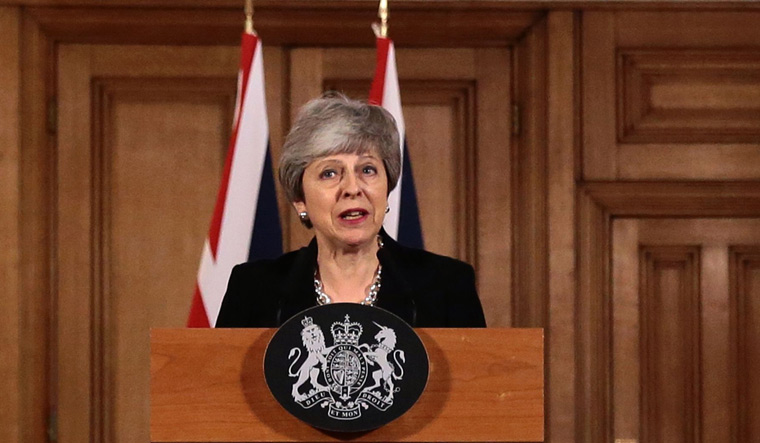British Prime Minister Theresa May is in quite a fix. But how did she get there or did her MPs push her to this place? Britain is in quite a hot mess with the Brexit situation which has been negotiated and renegotiated for more than two years now. After all this, and after her latest deal was rejected, May will now meet the 1922 committee, as a last resort to salvage her position along with to get Britain out of the mess it is in. May, in the meantime, has also offered to step down as the prime minister in June. But, is that necessary? It will not do anything to solve the current mess, not really.
also read
- UK: Sunak meets European Commission chief, to unveil North Ireland protocol deal
- British PM Sunak pledges to clinch new Brexit deal with EU
- EU vows action if UK changes post-Brexit Northern Ireland trade rules
- Eurotunnel says British citizens can't transit through France by road
- Jersey fishing rights dispute: UK deploys Royal Navy ships, France sends police boats
So, why are the members of parliament so keen on her stepping down? To reassess, the situation Britain is in, is not entirely May's fault. Former PM David Cameron, in a way, led to the premiss. The 2016 referendum result was interpreted by May as a backlash against uncontrolled immigration. But, the reason for the vote was much more complicated than that. May has, by all means, been trying her best to reduce the impact of the economic blow Britain might face if it leaves EU. Coming to a consensus in this regard seemed like a distant possibility right from the beginning.
But, these complications were not May's to begin with. Her predecessor Cameron was the one who called for the Brexit referendum in the first place. May's approach from the beginning has mean Brexit means Brexit. May, however, did not have full parliamentary support to go ahead with this from the word go. Another unfavourable condition was that Labour MP Jeremy Corbyn's leadership was under threat from Owen Smith. And no leader would agree to support an opposition leader when his own position is in question. May herself could not risk it by allying with the Labour Party. Lastly, quite a few MPs in parliament have expressed their wish to find a way around the Brexit referendum itself. This certainly puts May in a more difficult position.
True, 28 ministers have resigned ever since she became PM in 2017, and this combined with losing grip of the deal-making in Brussels and two major defeats of her deals by the MPs do put her in a vulnerable position. But, haven't premieres endured similar tribulations if not worse? Hardliners have stood behind her deal only to prevent a softer option. Leader of ERG, Jacob Rees-Mogg, said that, faced with such a choice, he now prefers May’s deal. There is no telling that the MPs would unite under possible successor Boris Johnson or Michael Gove for a smooth Brexit transition. The MPs' push to oust May will hardly make the second stage of Brexit, negotiations for future relations with EU any easier.
In light of this week's votes, the only other outcome looks like a permanent customs union in case May's deal is rejected yet again. For any other alternative the MPs could come up with would require EU to agree to it as well and that looks like a bleak possibility. The EU will not allow Britain to have a say in future trade deals and would insist that the current withdrawal agreement is accepted. Some EU countries according to Mujtaba Rahman of the Eurasia Group, feel that a long extension to Brexit might be more harmful than no Brexit at all. So all things considered, ousting May is hardly a wise move. Westminster should strongly reconsider.



